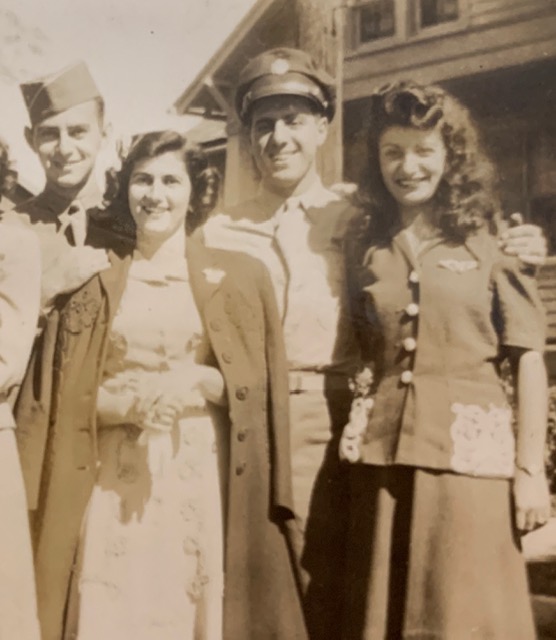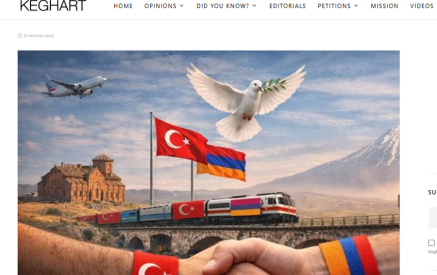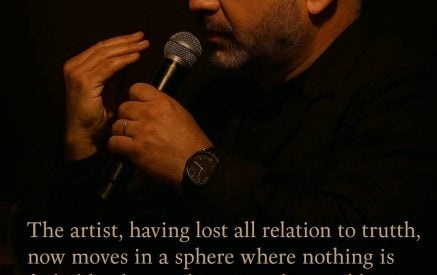The Armenian Weekly. As we begin a new year with hopes and dreams, let us pause to remember those who helped us get to where we are. It is called the cycle of life. We welcome with love the members of a new generation and with equal love, we say goodbye to another one. It is one of the many paradoxes of life. We build a dependency through our love and relationships knowing that we will be separated at one point. Our faith describes the separation as temporary but still humanly difficult. It is a gradual process. The next stage happens over perhaps a few decades for a generation.
In our U.S. diasporan Armenian community, it all began essentially with the “survivor” generation. For baby boomers, these people were their grandparents for the most part. For many of you reading this column as young parents, these were or are your great-grandparents. The survivor generation arrived here escaping genocide and broken family trees to begin a new life and established the core infrastructure of our communities. A large plurality of the survivors arrived from 1919 to 1923 which means that first generation was born a century ago. With the arrival of what is now the fourth generation of those born in America, the survivor generation has passed into eternity. We will always honor their presence, inspiration and values.
Today we are experiencing the departure of another generation. Many have departed with incredible legacies, and some remain with us as a growing presence of people in their 90s. For Americans, they have been referred to as “the greatest generation” based on their contributions to a pivotal time in US history. For Armenians, they represented the first generation of Armenians born in this country. They were supplemented over the succeeding years by immigrating Armenians of the same generation from other countries. They were the children of survivors who settled in Egypt, Lebanon, Syria or France. The Armenians born here were the first to experience the now well-documented “dual identity.” Armenian was spoken in their home, but they became exposed to American life and the English language as they were educated essentially in the public school systems. To many of us, they were our parents and grandparents. They were from two worlds: parents from the motherland, but American true and blue. Their parents escaped death and raised their children in America’s Great Depression. They survived because their parents taught them that the hardships of the economic collapse in America were tolerable after experiencing genocide.
I recall several stories of Armenians in the Indian Orchard community, where my paternal grandparents settled, sharing produce from their gardens with each other or refusing some form of government assistance. They were raised with pride and an incredible work ethic that would serve them well in life. It was a time of giving and not taking. Barely out of school, this generation responded to the call to save the world from tyranny from 1941 to 1945. They rushed to the recruiting offices to serve in the Marines, Army, Air Corps, Navy or Coast Guard. Women served in branches of the military and in essential auxiliary groups. While the men went to war, the women staffed the factories to produce the equipment essential to fight in two geographic locations. Posters of “Rosie the Riveter” displayed the unity and pride of the nation. This first generation born in this country was made up of proud Armenians and Americans. It was the real origin of the now popular sports tagline of “Do your job!” They accepted their responsibility with grace and dignity. It is amazing to realize that the oldest veterans of World War II are now in their 90s. My dear uncle from California was a member of the last draft in 1945 and is now 92. In the church hall where I was raised, there was a large glass frame picture of each veteran to serve from the community proudly—the “boys” as they were called. These were the fathers of my friends in the local Armenian community. We lost one young man at the Battle of the Bulge and another in the Korean War. During my AYF days, we always gave a trophy at Olympics in their memory. We were taught at a young age to honor and remember their sacrifices. The experiences of these men and women were diverse and intersected with great moments in American history. They were humble about their experiences, but incredible role models by example.
Read also
Our parents in this generation understood the sacrifices that parents make for the benefit of their children. Just as their parents rarely spoke of the Genocide, this generation preferred to move forward from the horrors of World War II. Their silence was a sign that only those who served truly understood the horrors of war. For those of the current generation, imagine a time when men and some women rushed to the recruiting offices to volunteer for service. In my generation, Vietnam was divisive, and unfortunately we blamed those who served. With the Middle East wars of the past two decades, our country has grown weary but has displayed great respect to those who served. My uncle was a survivor of the “Bataan Death March” in the Philippines. He was a POW for three and a half years and suffered unspeakable hardships. When liberated, he was less than 100 pounds but went on to lead a productive life with no hatred and was loved by many. His Christian values amazed me. Succeeding generations of their children (baby boomers), their grandchildren and even great grandchildren were the blessed beneficiaries of their wisdom. They left as boys and girls and returned as men and women ready to assume their responsibilities. Like their parents, world events had given them more of a life than their age would assume.
While experiencing the American life of tragedy and challenge, these men and women populated the Armenian youth groups that began to address the needs of the new generation. It was the true beginning of our hyphenated lives as they lived as American youth with an ethnic foundation. The glue was the respect they shared of their families and their heritage. The oldest of those youth groups is the AYF which was established in 1933. The organizing model was new and adapted for the American-born generation: educational, social and athletic activities to keep the generation whole as Armenian-Americans. The best indication of success is its sustainability. It is still a productive institution today, some 86 years later. The AYF Olympics began with this marvelous generation and today is still a remarkable multi-generation event that attracts thousands from older alumni to newborns. Attending an AYF Olympics is a remarkable experience for alumni, members, friends and family. In 1946, the ACYOA was born and began its service to this generation through the church. These organizations not only provided the first generation born here with an identity vehicle, but through their organizational work, they trained leaders who provided the community with the adult leadership required to sustain the diaspora.
Throughout the incredible life experiences of the 30s to the 60s, there was one constant for this generation: a strong Armenian family unit built on respect, love and shared values. Imagine the mental trauma of the survivor generation to escape genocide and build a new life for their families in America only to have to send their sons and some daughters to a world war. Thankfully most came home, but some didn’t. Some were POWs. Their lives were changed forever. Many believe that their experiences from 18 to 22 years old, when most kids today are enjoying college life, gave them unique qualifications to lead post-war America and the Armenian community. They married, raised families, built careers and became the heirs to the blossoming Armenian community. They led America during a remarkable period of growth and change into the 1970s. Their parents had built the foundation of the diaspora with sheer will. This generation would add new floors to that foundation with their American education and Armenian values. This was the generation that proved that truly Turkey had failed as “little Armenias” blossomed throughout America. Their children would be the second generation born in America and would elevate the community to new levels with the blessings of this country and the talent of immigrant brethren.
As a child in this second generation, we were the clueless beneficiaries of our parents’ remarkable dedication and Armenian values. We were the kids whose parents were always late for Cub Scouts, Girl Scouts or Little League games because they had a parish council, board of trustees or garmeer khatch meeting. We may not have understood it at the time, but we live today with eternal appreciation. Values are not a lecture, but an atmosphere you are raised in. They were the first of the full-time hyphenated Armenians who were also full-time community members, loyal citizens of their towns, dutiful parents. They carved out careers at a time when technology was not a productivity assistant as it is today. Multiplexing was done the old-fashioned way with sheer will power. My admiration grows each year with the benefit of true reflection.
We have been saying goodbye for several years now as our generations slowly depart just as those who replace them gradually emerge. This is God’s plan for us. As we say goodbye, remember to say thank you. As we pray for their souls, practice what they taught us. To forget the gifts we were given would be a shame. How will we remember our parents and grandparents? Of course, we will hold their family love close to our hearts. We also have an opportunity, perhaps a responsibility, to describe them to others as community leaders, dedicated servants, mentors and builders of what we enjoy today. We all need to be inspired. Sometimes it comes from the living, but it doesn’t have to end when their time on this earth ends. They live on in our hearts through the work that bonded us. Live life with the values that shaped their lives and that they imparted to you. Humble beginnings, a strong work ethic, love of family and faith made this generation special in our history and in our own lives. Many of them have moved on to eternity. If they are here on earth with us, cherish every moment, learn all you can and love with all your heart. Make those visits, cherish the pictures and hold on to those memories. They will grow in importance as the years go on. The greatest legacy is to be remembered.

























































